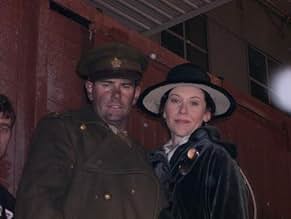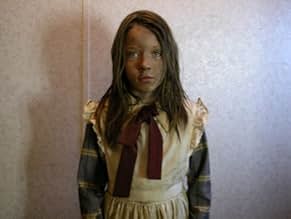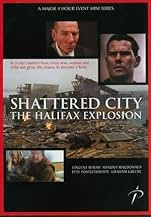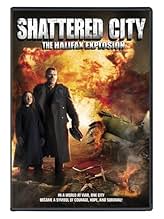IMDb रेटिंग
6.7/10
423
आपकी रेटिंग
अपनी भाषा में प्लॉट जोड़ेंA true story about the tragic explosion at Halifax Harbour, Canada, in the early hours of December 6, 1917.A true story about the tragic explosion at Halifax Harbour, Canada, in the early hours of December 6, 1917.A true story about the tragic explosion at Halifax Harbour, Canada, in the early hours of December 6, 1917.
- पुरस्कार
- 8 जीत और कुल 6 नामांकन
एपिसोड ब्राउज़ करें
फ़ीचर्ड समीक्षाएं
My commentary: First and foremost, while the emphasis was on human error in the movie, the fact is war is a very fertile breeding ground for accidents on top of the deliberate carnage. "Saving Private Ryan" noted this with the mention of the glider that was fitted with armor plating - but no one thought to tell the pilot. So it crashes and six soldiers are killed needlessly. Accounts of war proliferate in tragic incidents such as that one. The Halifax Explosion must be the biggest war-related accident in history.
The Great War featured incomprehensibly vast usage of artillery shells, and artillery shells need TNT and other explosives. A lot of this had to be imported from the U.S., and by ships. Ships had to be gathered in ports. Ports will then see a lot of ships coming and going, and harbor masters are going to be pressed to keep all this traffic moving. The odds were considerable something like the incident of Dec. 6th, 1917 would happen someplace in Allied ports sooner or later.
Captain Le Medec probably wasn't the greatest or bravest mariner of all time. But how many ship captains who have seniority or pull are going to agree to captain a massive floating bomb at the height of the U-boat menace? Second, did anyone notice that the movie exonerates harbor pilot Mackie while making Le Medec and the Belgian captain look like total dolts at the helm; and has Mackie trying to avert disaster while the Frenchman funks off with his crew? Considering it is a Canadian and not a French production, what a surprise.
Then there is the almost defeatist speech Capt. Collins gives to the war rally in the church. Excuse me, an *officer* in HM forces blurting out like that? It simply wouldn't have happened at the time. Contrary to what he later tells Barbara, Germans weren't close to suing for peace at the time, and the war wasn't kept going only because the Allies wanted another year of war profits. Indeed, with the Western Front stalemated and Russia close to surrender, Ludendorff et al were convinced victory for Germany was just around the corner. And a lot of people on the Allied side feared the same thing.
On the plus side, I was impressed by what the production did with a limited CBC budget.
The Great War featured incomprehensibly vast usage of artillery shells, and artillery shells need TNT and other explosives. A lot of this had to be imported from the U.S., and by ships. Ships had to be gathered in ports. Ports will then see a lot of ships coming and going, and harbor masters are going to be pressed to keep all this traffic moving. The odds were considerable something like the incident of Dec. 6th, 1917 would happen someplace in Allied ports sooner or later.
Captain Le Medec probably wasn't the greatest or bravest mariner of all time. But how many ship captains who have seniority or pull are going to agree to captain a massive floating bomb at the height of the U-boat menace? Second, did anyone notice that the movie exonerates harbor pilot Mackie while making Le Medec and the Belgian captain look like total dolts at the helm; and has Mackie trying to avert disaster while the Frenchman funks off with his crew? Considering it is a Canadian and not a French production, what a surprise.
Then there is the almost defeatist speech Capt. Collins gives to the war rally in the church. Excuse me, an *officer* in HM forces blurting out like that? It simply wouldn't have happened at the time. Contrary to what he later tells Barbara, Germans weren't close to suing for peace at the time, and the war wasn't kept going only because the Allies wanted another year of war profits. Indeed, with the Western Front stalemated and Russia close to surrender, Ludendorff et al were convinced victory for Germany was just around the corner. And a lot of people on the Allied side feared the same thing.
On the plus side, I was impressed by what the production did with a limited CBC budget.
CBC is doing what it is supposed to do and it's hard to fault them for that. This story of the Halifax Explosion of 1917 is good but it could be much better. It's also plagued by small errors. (A CNR logo in 1917? WW2 style posters in WW1. A 1930's folding camera with a flash? I don't think so. I spotted these in the first episode. I'm sure there were others.) The characters in the stories woven through the tragedy are both predictable and one dimensional. However the drama leading up to the explosion is well executed and the recreation of Halifax harbour full of old ships is effective. It's good but falls far short of being great.
I have to thank CBC, actually, for making this movie. Before a visit to Halifax on the QE2, I had never heard of the Explosion (typical American - although, in fact, I'm Canadian-born). But even seeing the great memorial didn't really register the extent of the disaster until I saw the movie. Yes, characters were combined or fictionalized in some cases, but that is absolutely secondary to the portrayal of that horrific episode in Canadian history. The effects of the blast were particularly well done. I hope it plays again, as indeed it should every couple of years or so, to remind us all of both the losses and the bravery incurred that day.
While this movie, and The Perfect Storm, and many others about war, ships and whatever else may be BASED on true stories and events...they are NOT true stories.
As there was NOT always somebody in every location at every second to document the event and the speeches and actions that people did, much of this story is fiction.
I found the movie interesting, that's for sure.
I found it a good insight to the event with a basic understanding to the incident...but it is still partially fiction.
What did impress me very much was that a film of this magnitude, a huge cast, a huge set, special effects and locations can be filmed for only 10 million dollars while a movie which takes place in very few locations with very few actors, few effects, few sets and much less than this film had will be shot for three or 4 times the budget.
Whoever worked the finances on this movie should be in public office to deal with the finances the Canadian and Provincial Governments budget problems.
They obviously know how to control the spending of money to the extreme.
Make-up, set design, acting and everything else was great too.
I am just overly impress with the people behind the cash flow...they really know how to spend the money, so that every cent is made to work.
As there was NOT always somebody in every location at every second to document the event and the speeches and actions that people did, much of this story is fiction.
I found the movie interesting, that's for sure.
I found it a good insight to the event with a basic understanding to the incident...but it is still partially fiction.
What did impress me very much was that a film of this magnitude, a huge cast, a huge set, special effects and locations can be filmed for only 10 million dollars while a movie which takes place in very few locations with very few actors, few effects, few sets and much less than this film had will be shot for three or 4 times the budget.
Whoever worked the finances on this movie should be in public office to deal with the finances the Canadian and Provincial Governments budget problems.
They obviously know how to control the spending of money to the extreme.
Make-up, set design, acting and everything else was great too.
I am just overly impress with the people behind the cash flow...they really know how to spend the money, so that every cent is made to work.
I really liked Vincent Walsh as the lead. He was very convincing in both the family-oriented scenes and the action stuff. The impending tragedy and the mundane actions that led to it were well-played and very gripping. It was nice to see a number of veteran Canadian actors like Lynne Griffin and Graham Green in large and small roles. I also thought the subplot about German saboteurs was both nicely diverting and added to the suspense. While Canadian productions can never hope to compete with Hollywood for budget and special effects, they can provide a Canadian "feel" to a project and "Shattered City" does that very well.
क्या आपको पता है
- ट्रिविया1,951 people were killed
- गूफ़There is a scene at the railway station in which a rail car carries the old CNR logo (A maple leaf with a box inside it containing the words "Canadian National Railways"). The CNR was formed in 1923.
- क्रेज़ी क्रेडिटThis film is dedicated to the spirit and the memory of Constance "Connie" Bond Young August 9, 1911 - February 22, 2003
- कनेक्शनFollowed by City of Ruins: The Halifax Explosion (2003)
टॉप पसंद
रेटिंग देने के लिए साइन-इन करें और वैयक्तिकृत सुझावों के लिए वॉचलिस्ट करें
- How many seasons does Shattered City: The Halifax Explosion have?Alexa द्वारा संचालित
विवरण
- रिलीज़ की तारीख़
- कंट्री ऑफ़ ओरिजिन
- आधिकारिक साइट
- भाषा
- इस रूप में भी जाना जाता है
- La explosión de Halifax
- फ़िल्माने की जगहें
- उत्पादन कंपनियां
- IMDbPro पर और कंपनी क्रेडिट देखें
- चलने की अवधि2 घंटे 55 मिनट
- रंग
- ध्वनि मिश्रण
- पक्ष अनुपात
- 1.78 : 1
इस पेज में योगदान दें
किसी बदलाव का सुझाव दें या अनुपलब्ध कॉन्टेंट जोड़ें

टॉप गैप
By what name was Shattered City: The Halifax Explosion (2003) officially released in India in English?
जवाब




























